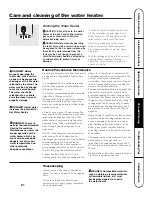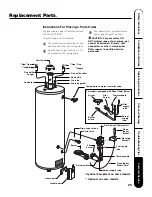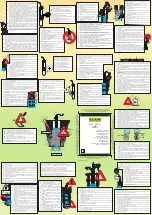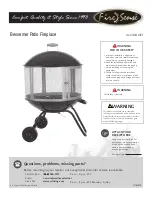
Care and cleaning of the water heater.
Draining the Water Heater
CAUTION: Shut off gas to the water
heater at the gas control (thermostat)
gas cock or manual shut-off valve
before draining water.
DANGER: Before manually operating
the relief valve, make certain no one will
be exposed to the hot water released by
the valve.The water drained from the
tank may be hot enough to present a
scald hazard and should be directed to
a suitable drain to prevent injury or
damage.
In order to drain the water heater, turn
off the cold water supply. Open a hot
water faucet or lift the handle on the
relief valve to admit air to the tank.
Attach a garden hose to the drain
valve on the water heater and direct
the stream of water to a drain. Open
the valve.
Test for spillage at the draft hood relief
opening after 5 minutes of burner
operation. Use a flame of a match or
candle or smoke.
Routine Preventative Maintenance
Properly maintained, your water heater will
provide years of dependable trouble-free
service.
It is suggested that a routine preventive
maintenance program be established and
followed by the user.
It is further recommended that a periodic
inspection of the gas control
(thermostat), burner, relief valve, internal
flue-way and venting system should be
made by service personnel qualified in gas
appliance repair.
At least once a year, lift and release the
lever handle on the temperature pressure
relief valve, located near the top of the
water heater, to make certain the valve
operates freely. Allow several gallons to
flush through the discharge line to an
open drain.
NOTICE: If the temperature and pressure
relief valve on the hot water heater
discharges periodically, this may be due to
thermal expansion in a closed water
system. Contact the water supplier or
your plumbing contractor on how to correct
this. Do not plug the relief valve outlet.
A water heater’s tank can act as a
settling basin for solids suspended in the
water. It is therefore not uncommon for
hard water deposits to accumulate in the
bottom of the tank. If allowed to
accumulate, these solids can cover the gas
control (thermostat) sensors, causing the
sensors to operate erratically.
Because accumulated solids can prevent the
gas control (thermostat) sensors from
accurately reading the water temperature,
the water at the fixture can be hotter than
the gas control (thermostat) dial setting. It
is suggested that a few quarts of water
be drained from the water heater’s tank
every month to clean the tank of these
deposits.
Rapid closing of faucets or solenoid valves
in automatic water using appliances can
cause a banging noise heard in a water
pipe. Strategically located risers in the
water pipe system or water hammer
arresting devices can be used to minimize
the problem.
The anode rod should be removed from the
water heater’s tank annually for
inspection and replaced when more than
6
″
of core wire is exposed at either end of
the rod.
Make sure the cold water supply is turned
off before removing anode rod.
Housekeeping
Vacuum around the base of the water
heater for dust, dirt and lint on a regular
basis.
To insure sufficient ventilation and
combustion air supply, proper clearances
must be maintained.
DANGER: Combustible materials,
such as clothing, cleaning materials,
or flammable liquids, etc., must
not be placed against or next to
the water heater.
21
DANGER:
Before
manually operating the
relief valve, make certain
no one will be exposed to
the danger of the hot water
released by the valve. The
water may be hot enough
to create a scald hazard.
The water should be
released into a suitable
drain to prevent injury or
property damage.
DANGER:
Hotter water
increases the potential for
Hot Water Scalds.
!
!
DANGER:
Failure to
perform the recommended
Routine Preventative
Maintenance can harm the
proper operation of this
water heater, which can
cause carbon monoxide
dangers, excessive hot
water temperatures and
other potentially
hazardous conditions.
!
Safety Instructions
Installation Instructions
Operating Instructions
Care and Cleaning
T
roubleshooting Tips
Customer Service







































